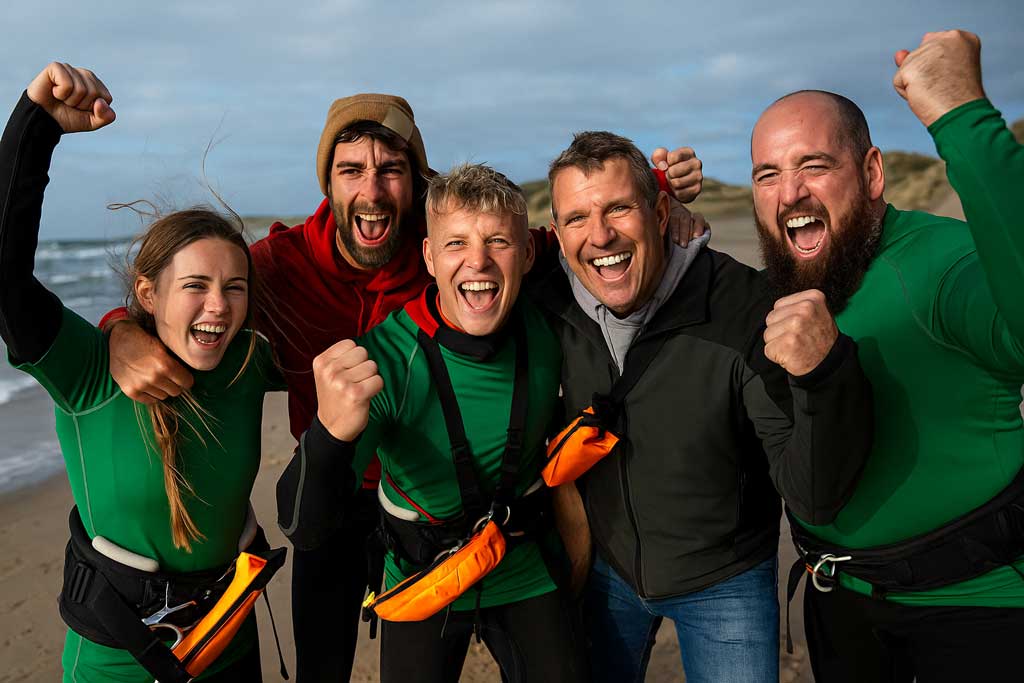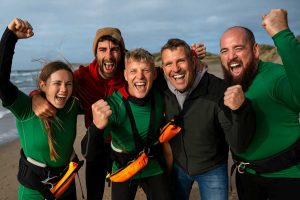Forget trust falls and office away days – the most progressive companies are using Cornwall’s rugged coastline to forge unbreakable team bonds. Here’s why corporate trainers are quietly revolutionising leadership development through adventure.
Sarah Jenkins thought she knew her marketing team pretty well after three years managing them. They were competent, professional, and got the job done. But watching her usually reserved graphic designer, Mark, encourage a terrified colleague through a 15-foot cliff jump during their coasteering in newquay session, she realized she’d barely scratched the surface of what her people were capable of.
Six months later, that same team delivered the company’s most successful campaign launch ever. Coincidence? Sarah doesn’t think so.
The Corporate Revolution You Haven’t Heard About
While most companies are still organizing trust exercises in hotel conference rooms, forward-thinking organizations are discovering something remarkable: authentic leadership emerges when people face genuine challenges together. And few activities create more authentic challenges than navigating Cornwall’s dramatic coastline.
“Traditional team building feels artificial because it is artificial,” explains Dr. Rachel Morrison, an organizational psychologist who studies adventure-based corporate development. “But when you’re helping a colleague through a challenging traverse or making split-second safety decisions together, you’re seeing and developing real character traits.”
Corporate training companies report that coasteering consistently produces more measurable improvements in team dynamics than conventional approaches. The reason lies in what psychologists call “stress inoculation” – controlled exposure to manageable challenges that build genuine resilience.
Leadership Development in Disguise
Here’s what happens during a typical coasteering session that you’d never achieve in a boardroom: natural leaders emerge organically. When faced with route-finding decisions or helping nervous teammates, hierarchy disappears and authentic leadership qualities surface.
“I watched our quietest intern become the group’s natural guide,” recalls James Thompson, HR director at a Bristol tech company. “He had the best water sense and started making safety calls that everyone naturally followed. Back in the office, he’s shown similar initiative in project management. The experience revealed capabilities we never knew he had.”
This organic leadership development is particularly valuable for identifying future managers and understanding team dynamics under pressure. Unlike role-playing exercises, coasteering reveals how people actually behave when stakes feel real.
Communication Under Pressure
Effective communication becomes critical when you’re navigating rocky coastlines and timing wave movements. Team members must give clear directions, listen actively, and adapt their communication style to different personalities and stress levels.
“The communication skills developed during coasteering transfer directly to high-pressure business situations,” notes leadership consultant Mark Davies, who regularly books sessions for executive teams. “When you’ve learned to give calm, clear instructions while hanging off a cliff face, boardroom presentations feel considerably less intimidating.”
The environment forces participants to overcommunicate – explaining routes, checking understanding, and constantly updating safety information. These habits persist back in the workplace, reducing misunderstandings and improving project coordination.
Problem-Solving in Real Time
Every coasteering route presents unique challenges that require creative problem-solving and adaptive thinking. Teams must assess risks, develop strategies, and adjust plans based on changing conditions – all while supporting each other emotionally and practically.
“It’s like a business case study, except the consequences feel immediate and real,” explains corporate trainer Lisa Chen, who specializes in adventure-based development. “Teams learn to make decisions quickly, communicate effectively under pressure, and support colleagues who are struggling.”
These problem-solving skills prove invaluable in business contexts where teams must navigate uncertainty, adapt to changing market conditions, and support each other through challenging periods.
Building Genuine Trust
Trust exercises in meeting rooms feel forced because everyone knows they’re safe. But trusting someone to spot your cliff descent or help you time a jump creates bonds that feel authentic because they are authentic.
“When someone has literally had your back on a cliff edge, you trust their judgment in meetings differently,” observes Thompson. “The trust built during our coasteering session has made our team more willing to take creative risks and support each other’s bold ideas.”
This trust translates into improved collaboration, more honest feedback, and greater willingness to ask for help when needed – all crucial elements of high-performing teams.
Stress Management Training
Coasteering provides controlled stress exposure that helps teams develop better stress management strategies. Participants learn to remain calm under pressure, support stressed colleagues effectively, and maintain performance when adrenaline is flowing.
“Teams that have managed their nerves together on cliff faces handle workplace pressure more effectively.”
“It’s stress inoculation training disguised as adventure,” notes Dr. Morrison. “Teams that have managed their nerves together on cliff faces handle workplace pressure more effectively.”
The Assessment Opportunity
For HR professionals, coasteering provides unprecedented insight into employee behavior and potential. Natural leaders emerge, communication styles become apparent, and stress responses reveal true character traits.
“I learn more about candidates’ real capabilities in three hours of coasteering than six months of performance reviews,” admits one recruitment director who uses adventure activities for senior hire assessments.
Why Newquay Works Perfectly
Cornwall’s coastline offers the ideal combination of accessible adventure and professional infrastructure. The environment feels genuinely challenging while remaining controllable, and experienced guides ensure safety while allowing teams to face real decisions and consequences.
The dramatic setting also creates lasting memories that strengthen the lessons learned. Teams regularly reference their coasteering experience months later when facing workplace challenges.
The Bottom Line
Progressive companies are discovering that meaningful team development requires meaningful challenges. While competitors are still organising PowerPoint presentations about communication, smart organisations are using Cornwall’s coastline to forge genuine bonds, develop authentic leadership, and build resilient teams.
The question isn’t whether adventure-based team building works – the results speak for themselves. The question is whether your company can afford to keep falling behind while others gain the competitive advantage that comes from truly cohesive, confident teams.
Sometimes the best business training happens nowhere near a boardroom.



